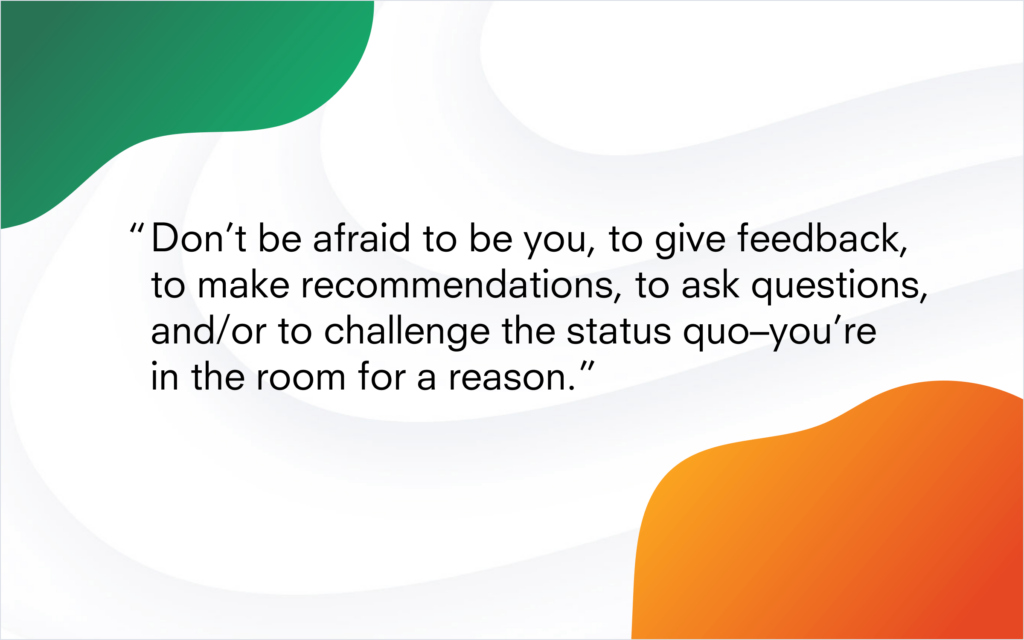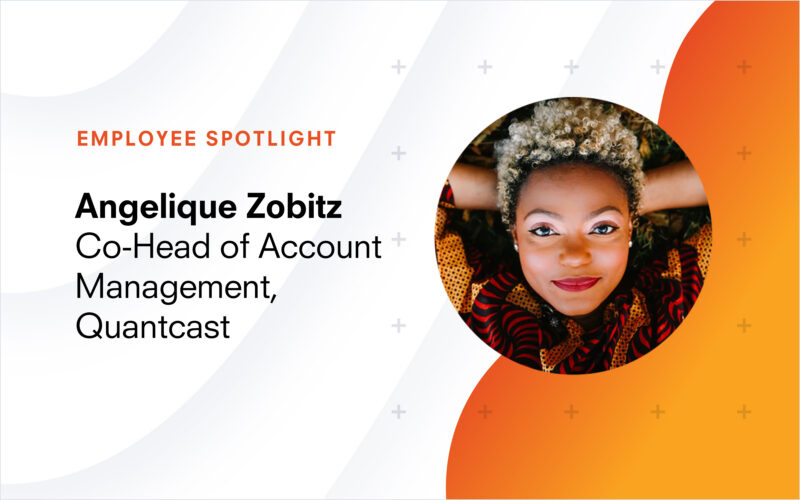In February, we celebrate Black History Month, recognizing and honoring the rich contributions of Black Americans to the United States. At Quantcast, we are shining the spotlight on inspiring team members, starting with Angelique Zobitz. In this interview, she explains why she values diversity at Quantcast, why Black History Month is still needed, what advice she gives to other Black women in tech, and how poetry allows her to share her lived experiences with others.
1. First, tell the world about your role at Quantcast.
I’m the Co-Head of Account Management (Central & West) Commercial Sales organization; I oversee a phenomenal team of 1 regional account director, 1 manager of am, 3 account directors, and 6 key and senior account managers across Washington, California, Texas, Illinois, Tennessee, Michigan, and Missouri.
2. Quantcast is committed to fostering a culture of diversity, inclusion, equity, and belonging in the workplace. Are these values important to you as an employee?
During my interviewing and onboarding process, the diversity of individuals at Quantcast stood out as something special and unique in the ad tech space. Quantcast’s employee resource groups acknowledge, support, align with, and uplift peoples’ unique life experiences and intersections and make a world of difference in my quality of life as a Black person, parent, woman, and LGBTQIA+ ally. Specifically, the Diversity Leadership at Quantcast (DLQ) group brings together underrepresented groups and their allies through advocacy and regular participation in community opportunities and ensures I continue to expand my understanding of experiences beyond my own.
3. As we celebrate Black History Month, can you tell us why it’s important to you?
In a broad view, Black history is world history. And as recent years have starkly reilluminated, intentional obscurification to minimize the contributions, influence, and impact of the worldwide Black community on history has enabled ignorance to persist, slowing down the wheels of change. Black history is lived every day, so I look forward to a time when a truly nuanced, accurate, comprehensive view of history is widely understood and not just explored deeply during a singular month each year.
And personally, Black History Month is important because I’m proud to be part of such a vibrant, resilient, culturally rich diasporic community whose contributions have made such an indelible impact on the world.
4. What leaders in history have inspired you?
There are innumerable examples in history of individuals who have inspired me: Ex-Presidential candidate and Congresswoman Shirley Chisolm, Fannie Lou Hamer, Ida B. Wells, John Lewis, The Lovings, and the Little Rock Nine, to name a few. History is being made every day and I am constantly inspired and amazed by contemporary individuals including Stacey Abrams, Nikole Hannah-Jones, Tarana Burke, Kimberlé Crenshaw, Isabel Wilkerson, Ben Crump, and the founders of #BlackLivesMatter—the civil rights activists, lawyers, and historians who ensure honesty, transparency, accountability, and change in our present and future. I’m inspired by the individuals who, in the words of John Lewis, “Get in good trouble, necessary trouble.”
5. What advice would you give to other Black women in tech?
This is important for womxn in tech, but especially Black womxn in tech, where we are a super-minority: don’t be afraid to stand out.
We’re going to stand out by the fact that we’re even in the room, so let that empower you to not just be seen but also heard.
Don’t be afraid to be you, to give feedback, to make recommendations, to ask questions, and/or to challenge the status quo–you’re in the room for a reason.

6. Outside of the workplace, you make your voice heard as a poet. In fact, you’re a Pushcart Prize-nominated poet! Tell us about poetry as a medium for expressing the Black American experience.
Poetry is a passion that enables me to speak to my lived experiences and how I navigate the world. As a result, it’s definitely informed by my intersections and alliances, my family, and what’s happening around me. A fair amount of my poetry is rooted in exploring the legacies we’ve been given, how it plays out in the present, and the imagining of a future world where harmful structures have been dismantled.
In general, poets have the innate need to write about the past, present, and future to make sense of the world; as a result, poetry has always been a record-keeping of the histories and attitudes of a poet, the time, and the poet’s hopes for the future.
Individually and collectively: what we remember, what we forget, what we acknowledge, and what we speak reflect our priorities.
A poet’s work is to name the unnameable, to point at frauds, to take
sides, start arguments, shape the world, and stop it going to sleep—
-Salman Rushdie
So I like to do all of that with my work.
I’ve been lucky in my artistic career to have published two books: Love Letters to The Revolution and Burn Down Your House, received some awards, and taken part in such a vibrant, diverse, and thoughtful community.
Learn more
As we continue celebrating Black History Month, we look forward to sharing more about Quantcast’s learning and discussion events, and we will be highlighting another remarkable team member.
Make sure you follow us here and on LinkedIn, Twitter, Instagram, and Facebook for more. And, if you’d like to join our team, we’re hiring!
